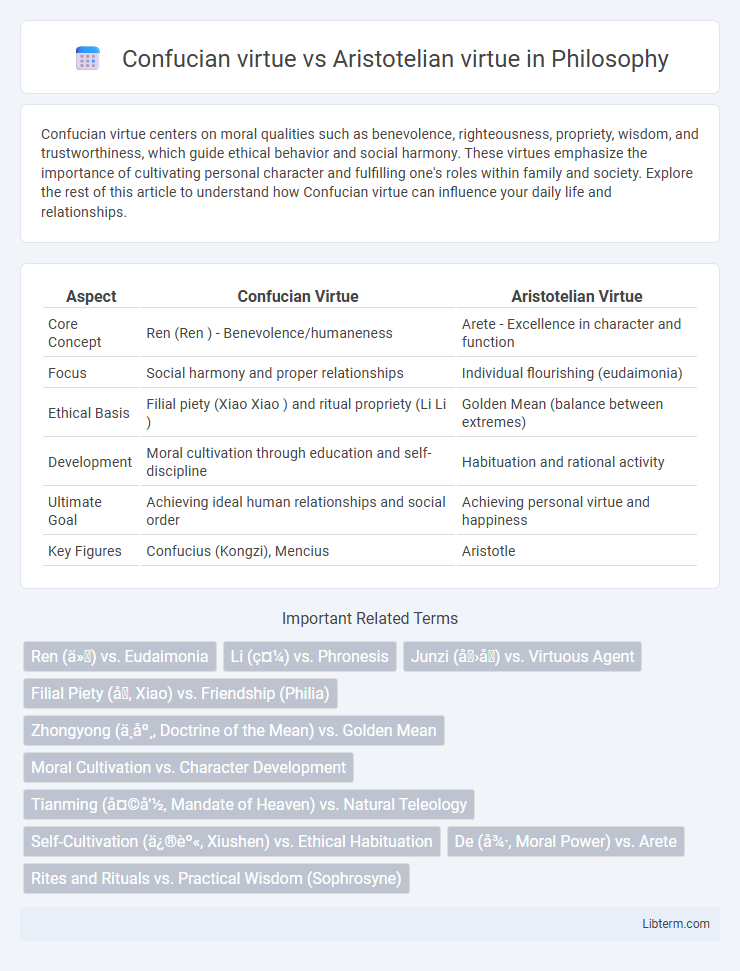Confucian virtue centers on moral qualities such as benevolence, righteousness, propriety, wisdom, and trustworthiness, which guide ethical behavior and social harmony. These virtues emphasize the importance of cultivating personal character and fulfilling one's roles within family and society. Explore the rest of this article to understand how Confucian virtue can influence your daily life and relationships.
Table of Comparison
| Aspect | Confucian Virtue | Aristotelian Virtue |
|---|---|---|
| Core Concept | Ren (Ren ) - Benevolence/humaneness | Arete - Excellence in character and function |
| Focus | Social harmony and proper relationships | Individual flourishing (eudaimonia) |
| Ethical Basis | Filial piety (Xiao Xiao ) and ritual propriety (Li Li ) | Golden Mean (balance between extremes) |
| Development | Moral cultivation through education and self-discipline | Habituation and rational activity |
| Ultimate Goal | Achieving ideal human relationships and social order | Achieving personal virtue and happiness |
| Key Figures | Confucius (Kongzi), Mencius | Aristotle |
Introduction to Confucian and Aristotelian Virtue
Confucian virtue centers on ren (benevolence) and li (ritual propriety), emphasizing harmonious social relationships and moral self-cultivation within community roles. Aristotelian virtue prioritizes eudaimonia (flourishing) achieved through the balance of character traits and practical wisdom (phronesis) in individual ethical development. Both philosophies focus on virtuous character but diverge in the social context and the ultimate goal of virtue, with Confucianism highlighting relational ethics and Aristotle promoting personal excellence.
Philosophical Foundations of Virtue Ethics
Confucian virtue ethics centers on *ren* (benevolence) and *li* (ritual propriety), emphasizing relational harmony and moral cultivation within social contexts as foundational to ethical behavior. Aristotelian virtue ethics, rooted in *eudaimonia* (flourishing), prioritizes rationality and the development of individual character traits through habituation and practical wisdom (*phronesis*). Both frameworks underscore virtue as a mean between extremes but diverge epistemologically, with Confucianism stressing communal roles and Confucius's moral psychology, while Aristotle focuses on individual moral agency and objective rational principles.
Core Concepts in Confucian Virtue
Confucian virtue centers on the cultivation of ren (benevolence), yi (righteousness), and li (proper conduct) to achieve social harmony and moral character development. Unlike Aristotelian virtue, which emphasizes individual excellence through habituation and the Golden Mean, Confucianism prioritizes relational ethics and the role of ritual in fostering virtuous behavior. Central to Confucian virtue is the continuous self-improvement guided by filial piety and the harmonious integration within family and society.
Essential Elements of Aristotelian Virtue
Aristotelian virtue centers on rationality and the development of character through habituation, emphasizing the "Golden Mean" as the balance between excess and deficiency. Key elements include practical wisdom (phronesis), moral virtues like courage and temperance, and the goal of achieving eudaimonia, or human flourishing. In contrast, Confucian virtue prioritizes social harmony, filial piety, and ritual propriety, focusing on relational ethics rather than individual rational balance.
Human Nature: Confucianism vs Aristotelianism
Confucian virtue centers on cultivating harmony and moral character through relational roles and rites, emphasizing human nature as intrinsically good but needing cultivation via education and social practice. Aristotelian virtue is rooted in the concept of eudaimonia, framing human nature as rational and aimed at achieving the highest good through the development of intellectual and moral virtues by habituation. While Confucianism highlights interpersonal harmony and societal duty, Aristotelianism focuses on individual flourishing through reason and balanced character traits.
Role of Community and Relationships
Confucian virtue emphasizes the cultivation of moral character through harmonious relationships and fulfilling social roles within the family and society, highlighting virtues such as filial piety, loyalty, and righteousness. Aristotelian virtue centers on achieving eudaimonia through individual excellence and rational activity, while recognizing the importance of friendship and civic participation for moral development. Both philosophies underscore the interdependence of personal virtue and social context, with Confucianism prioritizing collective harmony and Aristotle stressing balanced engagement in communal life.
Moral Cultivation and Personal Development
Confucian virtue emphasizes moral cultivation through self-discipline, filial piety, and continuous learning within a social and relational context, fostering harmony and proper conduct. Aristotelian virtue centers on achieving eudaimonia by developing practical wisdom (phronesis) and habituating virtuous character traits through deliberate action and rational choice. Both philosophies value personal development but diverge in focus: Confucianism prioritizes social roles and communal responsibilities, while Aristotelian ethics highlight individual flourishing through balanced virtues.
Practical Wisdom in Confucian and Aristotelian Thought
Practical wisdom in Confucian thought, known as "zhongyong," emphasizes harmonious balance and moral intuition cultivated through self-cultivation and social relationships. In Aristotelian virtue ethics, practical wisdom or "phronesis" is the intellectual virtue that enables reasoning well about human goods and making ethical decisions grounded in rational deliberation. Both traditions prioritize moral development but differ in methodology: Confucianism integrates virtue with communal roles and rituals, while Aristotle focuses on individual rationality and objective mean-finding.
Comparison of Moral Ideals and Goals
Confucian virtue emphasizes harmony, filial piety, and social roles as the foundation for moral development, prioritizing collective well-being and relational duties. Aristotelian virtue centers on achieving eudaimonia through rationality and the cultivation of individual virtues such as courage and temperance, aiming for personal flourishing. Both frameworks value character development but differ in moral ideals, with Confucianism focusing on societal harmony and Aristotle highlighting individual excellence.
Contemporary Relevance of Confucian and Aristotelian Virtue
Confucian virtue emphasizes relational harmony, filial piety, and social roles, making it highly relevant in contemporary discussions on community-oriented ethics and collective well-being. Aristotelian virtue centers on individual character development and rational moderation, providing foundational insights for modern debates on personal responsibility and moral education. Their combined relevance fosters a balanced approach to both personal excellence and social harmony in today's multicultural societies.
Confucian virtue Infographic

 libterm.com
libterm.com